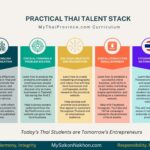Thailand Education Reform: Less English, More Thai

Much has been written about Thailand’s struggle to learn the English language. Nearly every year there is hand-wringing over Thailand’s basement floor ranking in English acquisition among Southeast Asian countries. Thai Education Ministers from multiple ruling parties have long championed “education reform” as a top objective. Having taught at Thai universities for for two decades, we have had our own share of frustrations and hand-wringing. However, in recent years that has all changed. While we still view it important for Thais to learn the basics of the English language, we no longer see “fluency” a worthwhile objective for most Thai people (even if it were possible to achieve).
English is undeniably the global lingua franca, and there are compelling reasons for Thailand to teach it to students at an early age. But technology is progressing at such a rapid pace that soon English fluency will be completely unnecessary for Thais to communicate with English speaking co-workers, tourists, retailers, etc.
Instant Thai to English and English to Thai translations (in both audio and print) will likely be available to everyone with a smartphone within the next 5 years. All you’ll need to do is put in your earbuds, click the live translation button, and begin chatting away with anyone — regardless of their language.
Translation tools will have improved so much that Thai schools could spend less time teaching English, and more time expanding Thai language instruction. This would not only help maintain and protect Thai culture and traditions, it would enrich them as well.
The Importance of Thai Language Instruction
The Thai language is more than just a communication tool. It is a repository of Thailand’s history, values, traditions, and unique ways of thinking. By expanding Thai language education, Thailand would safeguard its cultural heritage and ensure that future generations remain deeply connected to their roots — fostering a sense of national pride and unity.
We don’t mean to suggest that English instruction should be abandoned altogether. Like we said, the basics should still be taught to all students. There also should be classes that teach the tips, tricks, and strategies for using English/Thai translation and grammar tools in the most efficient and productive manner. In addition, there should be paths open to those Thais who would like to learn English at a high level.
However, there are currently many hours of English instruction being essentially wasted without any benefit. If a large portion of those hours were dedicated to advanced Thai language instruction, this would promote a greater understanding of Thailand’s linguistic diversity, allowing the Kingdom’s numerous dialects, accents, and cultural expressions to flourish.
These linguistic variations (such as Isaan in the Northeast, Kam Mueang in the North, and Pak Tai in the South) contribute to the richness of Thailand’s societal fabric. If more Thai students were taught these regional dialect, this would foster an inclusive environment where all citizens could express themselves freely. It also could help heal some societal divisions and improve the political landscape.
Economic & Cultural Growth
Contrary to the belief that English fluency is an economic necessity, many countries have thrived without making English education a national concern. A Thailand education reform plan that expanded Thai language instruction could lead to the creation of more homegrown industries and businesses that cater to the specific needs and preferences of local populations.
Additionally, this approach to Thailand education reform would encourage investment in language-related fields such as Thai literature, Thai arts, Thai media, and Thai entertainment. By tapping into its unique linguistic identity, Thailand could attract more international attention, grow its tourism industry, and contribute to global cultural diversity.
- Affirmations in Buddhism & Thailand - June 7, 2025
- Speak Thai Naturally Without the Gymnastics - April 20, 2025
- The Best Learn Thai Podcast and YouTube Channel - April 10, 2025




